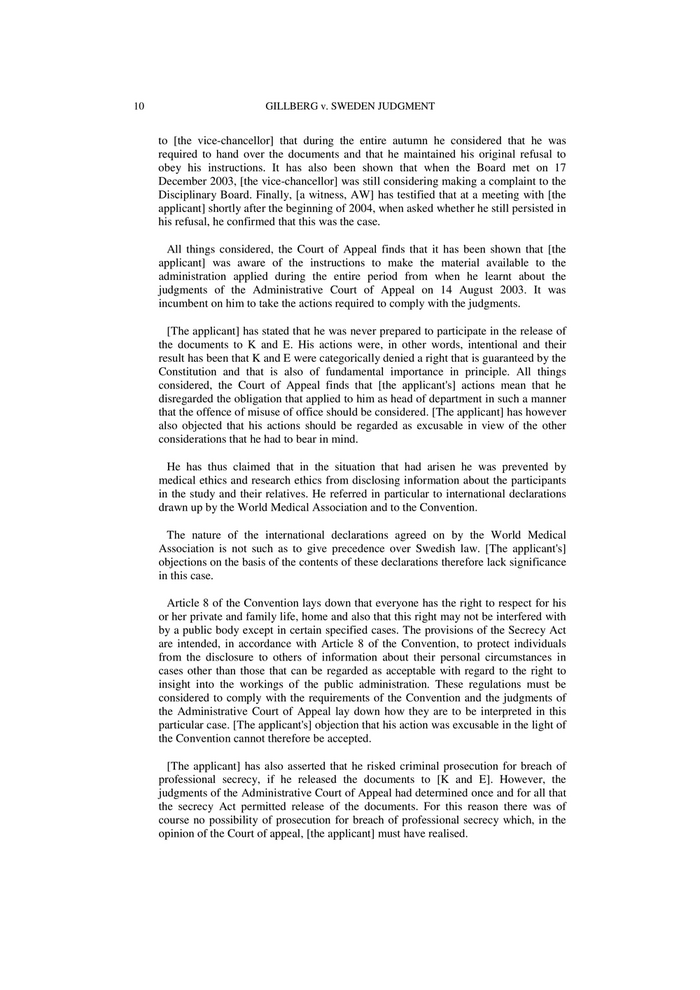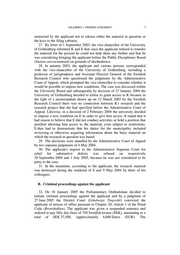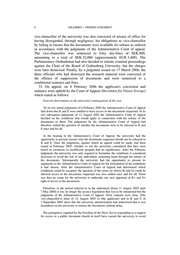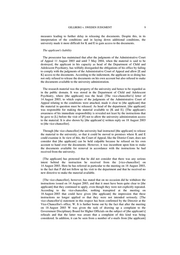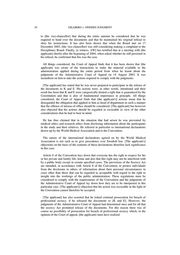Information
- Aktenzeichen
- 41723/06
- Datum
- 2. November 2010
- Gericht
- Europäischer Gerichtshof für Menschenrechte
- Gesetz
- Europäische Menschenrechtskonvention
Urteil: Europäischer Gerichtshof für Menschenrechte am 2. November 2010
41723/06
In dem Fall "Gillberg gegen Schweden" weigerte sich der klageführende Wissenschaftler trotz einer verpflichtenden Gerichtsentscheidung, Daten aus einem medizinischen Forschung seiner Universität herauszugeben. Die Universität selbst hatte hingegen beabsichtigt, das Urteil zu befolgen. Die Unterlagen wurden zwischenzeitlich vernichtet. Ein schwedisches Gericht verurteilte den Kläger in der Folge strafrechtlich wegen Amtsmissbrauchs. Gegenüber dem Europäischen Gerichtshof für Menschenrechte (Kammer) machte er unter anderem geltend, durch die strafrechtliche Verurteilung in seinem Recht auf (negative) Meinungsäußerungsfreiheit nach Art. 10 Europäische Menschenrechts verletzt worden zu sein. Der Europäische Gerichtshof entscheidet, dass eine solche Rechtsverletzung nicht vorlag. Das Urteil enthält detaillierte Ausführungen zum Verhältnis zwischen Forschungsfreiheit, Informationsfreiheit und Datenschutz. Die Entscheidung liegt ausschließlich in englischer und französischer Sprache vor. (Quelle: LDA Brandenburg)
Allgemein zugängliche Quelle Anwendungsbereich/ Zuständigkeit Personenbezogene Daten
THIRD SECTION CASE OF GILLBERG v. SWEDEN (Application no. 41723/06) JUDGMENT STRASBOURG 2 November 2010 This judgment will become final in the circumstances set out in Article 44 § 2 of the Convention. It may be subject to editorial revision.

2 GILLBERG v. SWEDEN JUDGMENT In the case of Gillberg v. Sweden, The European Court of Human Rights (Third Section), sitting as a Chamber composed of: Josep Casadevall, President, Elisabet Fura, Boštjan M. Zupančič, Alvina Gyulumyan, Ineta Ziemele, Luis López Guerra, Ann Power, judges, and Santiago Quesada, Section Registrar, Having deliberated in private on 28 September 2010, Delivers the following judgment, which was adopted on that date: PROCEDURE 1. The case originated in an application (no. 41723/06) against the Kingdom of Sweden lodged with the Court under Article 34 of the Convention for the Protection of Human Rights and Fundamental Freedoms (“the Convention”) by a Swedish national, Mr Christopher Gillberg (“the applicant”), on 10 October 2006. 2. The applicant was represented by Mr Bertil Bjernstam, a Bachelor of Laws from Gothenburg. The Swedish Government (“the Government”) were represented by their Agent, Mrs Inger Kalmerborn from the Ministry for Foreign Affairs. 3. The applicant alleged, in particular, that in civil proceedings concerning access to various research material, and in subsequent criminal proceedings against him, his rights under Articles 6, 7, 8, 10 and 13 of the Convention had been breached. 4. On 17 June 2008 the Court decided to give notice of the application to the Government. It also decided to examine the merits of the application at the same time as its admissibility (Article 29 § 3). 5. The applicant and the Government each filed written observations (Rule 59 § 1). THE FACTS I. THE CIRCUMSTANCES OF THE CASE 6. The applicant was born in 1950 and lives in Gothenburg.

GILLBERG v. SWEDEN JUDGMENT 3 7. He is a professor, specialising in child and adolescent psychiatry, at the University of Gothenburg. 8. In the period between 1977 and 1992 a research project was carried out at the University of Gothenburg in the field of neuropsychiatry focusing on the incidences of Attention-Deficit Hyperactivity Disorder (ADHD) or Deficits in Attention, Motor Control and Perception (DAMP) in children. The aim was to elucidate the significance thereof and associated problems from a long-term perspective. Parents to a group of one hundred and forty-one pre-school children volunteered to participate in the study, which was followed up every third year. Certain assurances were made to the children's parents and later to the young people themselves concerning confidentiality. The research papers, called the Gothenburg study, were voluminous and consisted of a large number of records, test results, interview replies, questionnaires and video and audio tapes. It contained a very large amount of privacy-sensitive data about the children and their relatives. Several doctoral theses have been based on the Gothenburg study. The material was stored by the Department of Child and Adolescent Psychiatry, of which the applicant was director. The project was originally set up and started by other researchers but the applicant had subsequently taken over the responsibility for completing the study. 9. The applicant alleged that the Ethics Committee of the University of Gothenburg in their permits had made it a precondition that sensitive information about the individuals participating in the study would be accessible only to the applicant and his staff and that therefore the applicant promised absolute confidentiality to the patients and their parents. 10. The Government maintained in their observations that they had been unable to find the permits referred to by the applicant, thus they could not confirm that the permits contained requirements of “absolute secrecy”. Instead the Government had located four research applications to the Ethics Committee of the University of Gothenburg (dated 13 January 1978, 26 January 1984, 9 October 1984 and 24 March 1988) according to which the applicant bore the main responsibility for the study in 1988 and, together with his wife, also in 1984, but not for the study in 1978. Concerning the issue of secrecy, the research applications can be summarised as follows: In the first application, it was stated that it would not be possible to identify individual children and that the research team did not intend to register any case records. In the first of the two applications submitted in 1984, it was stated that the project leader - being a medical doctor - was bound by professional secrecy and was to be responsible for the registers set up within the research project, that the registers were to be made non-personalised after the study had been carried out and that the results were to be presented in a way that would make it impossible to identify different individuals. Furthermore, if data registers were to be used, the Data Inspection Board's (Datainspektionen) instructions were to be followed. In an additional

4 GILLBERG v. SWEDEN JUDGMENT application from the same year, concerning inter alia the use of social registers, it was stated that it would not be possible to identify different individuals through the data processing that was to be carried out and that only the project leader was to have access to the identification code. The application from 1988 contains the same language as the application submitted in January 1984. 11. Before the Court, enclosed in his observations, the applicant submitted two permits by the Ethics Committee of the University of Gothenburg of respectively 9 March 1984 and 31 May 1988. 12. Both permits bore signatures of approval on behalf of the Ethics Committee of the University of Gothenburg on the applications of 26 January 1984 and 24 March 1988, mentioned above. The submitted permits contained no reference to “absolute secrecy”. 13. The assurance of confidentiality given to the participants in the study in 1984 had the following wording: “All data will be dealt with in confidence and classified as secret. No data processing that enables the identification of your child will take place. No information has been provided previously or will be provided to teachers about your child except that when starting school she/he took part in a study undertaken by Östra Hospital and its present results will, as was the case for the previous study three years ago, be followed up.” 14. A later assurance of confidentiality had the following wording: “Participation is of course completely voluntary and as on previous occasions you will never be registered in public data records of any kind and the data will be processed in such a way that nobody apart from those of us who met you and have direct contact with you will be able to find out anything at all about you.” A. Proceedings concerning access to the research material 15. In February 2002, a sociologist K requested access to the background material. She was a researcher at Lund University and maintained that it was of great importance to have access to the research material and that it could, without risk of damage, be released to her with conditions under Chapter 14, section 9, of the Secrecy Act. She had no interest in the personal data as such but only in the method used in the research and the evidence the researchers had for their conclusions. Her request was refused on 27 February 2002 by the University of Gothenburg because K had not shown any connection between the requested material and any research and on the ground that the material contained data on individuals' health status which, if disclosed, could be assumed to harm an individual or persons related to that individual. The decision was appealed against to the Administrative Court of Appeal (Kammarrätten i Göteborg), which directed the matter to the University of Gothenburg to examine whether the material could be released after removal of identifying

GILLBERG v. SWEDEN JUDGMENT 5 information or with a condition restricting K's right to pass on or use data. The University of Gothenburg refused the request again on 10 September 2002 on the ground that the data requested was subject to secrecy, that there was no possibility of releasing the material after removal of identifying information, nor was there sufficient evidence to conclude that the requested material could be released with conditions. K appealed again against the decision to the Administrative Court of Appeal. 16. In the meantime, in July 2002, a paediatrician E, also requested access to the material. He submitted that he needed to keep up with current research, that he was interested in how the research in question had been carried out and in clarifying how the researchers had arrived at their results and that it was important to the neuropsychiatric debate that the material could be exposed to independent and critical examination. His request was refused by the University of Gothenburg on 30 August 2002 for the same reasons as its refusal to K, a decision against which E appealed to the Administrative Court of Appeal. 17. By two separate judgments of 6 February 2003, the Administrative Court of Appeal found that K and E had shown a legitimate interest in gaining access to the material in question and that they could be assumed to be well acquainted with the handling of confidential data. Therefore, access should be granted to K and E, but subject to conditions made by the University of Gothenburg in order to protect the interests of the individuals concerned in accordance with various named provisions of the Secrecy Act (Sekretesslagen, 1980:100). 18. The University of Gothenburg's application for a review by the Supreme Administrative Act was refused. 19. In vain the applicant and some of the individuals participating in the study requested relief for substantive defects (resning) to the Supreme Administrative Court (Regeringsrätten), which was refused on 4 April 2003 because they were not considered to be party to the case (bristende talerätt). 20. On 7 April 2003 the University of Gothenburg decided that – “provided that the individuals concerned gave their consent” – the documents would be released to K and E with conditions specified in detail in the decisions. 21. K and E appealed against certain of the conditions imposed by the University of Gothenburg. They also reported the University of Gothenburg's handling of the case to the Parliamentary Ombudsman, which in decisions of 10 and 11 June 2000 criticised the University of Gothenburg, notably as to the length of the proceedings for replying to the request for access. 22. In two separate judgments of 11 August 2003, the Administrative Court of Appeal lifted some of the conditions imposed by the university. It pointed out that in the judgments of 6 February 2003, K and E had already been given the right of access to the requested documents and that the only

6 GILLBERG v. SWEDEN JUDGMENT matter under examination was the conditions set up and that such could only be imposed if they were designed to remove a given risk of damage and that a condition should be framed to restrict the recipient's right of disposal over the data. Thereafter, six conditions were set regarding K's access, including that the data was only to be used within the Swedish Research Council funded research project called “The neurological paradigm: on the establishment of a new grand theory in Sweden” which K had specified before the Administrative Court of Appeal, that she was not allowed to remove copies from the premises where she was given access to the documents and that transcripts of released documents containing data on psychological, medical or neurological examinations or treatment, or concerning the personal circumstances of individuals and notes concerning such examinations, treatment or circumstances from a document released to her, would be destroyed when the above research project was completed and at the latest by 31 December 2004. Six similar conditions were also imposed on E, including that data in the released documents referring to psychological, medical, psychiatric or neurological examinations or treatment, and data in the released documents concerning the personal circumstances of an individual was to be used for examination of how the researchers who participated in the research project in which the documents had been used had arrived at their results and conclusions and so that he could generally maintain his competence as a paediatrician. 23. The University of Gothenburg did not have a right to appeal against the judgments and on 5 November 2003 the applicant's request to the Supreme Administrative Court for relief for substantive defects was refused because he was not considered to be a party to the case. 24. In the meantime, in a letter of 14 August 2003 to the applicant, the vice-chancellor of the university stated that, by virtue of the judgments by the Administrative Court of Appeal, E and K were entitled to immediate access to the documents on the conditions specified. Furthermore, by decision of the university, E and K were to be given access to the documents on the university's premises on a named street and the documents therefore had to be moved there from the Department of Child and Adolescent Psychiatry without delay. The letter stated that the transportation of the documents was to begin on 19 August 2003 at 9 a.m. The applicant was requested to arrange for the documents to be available for collection at that time and that if necessary he should also ensure that all the keys to the rooms where the material was kept were delivered to a person P. 25. The applicant replied in a letter of 18 August 2003 that he did not intend to hand over either the material or the keys to the filing cabinets to P. On the same day the vice-chancellor had a meeting with the applicant. 26. On instruction by the vice-chancellor, on 19 August 2003 P visited the Department of Child and Adolescent Psychiatry. He was met by controller L, who handed him a document showing that L had been

GILLBERG v. SWEDEN JUDGMENT 7 instructed by the applicant not to release either the material in question or the keys to the filing cabinets. 27. By letter of 1 September 2003, the vice-chancellor of the University of Gothenburg informed K and E that since the applicant refused to transfer the material for the present he could not help them any further and that he was considering bringing the applicant before the Public Disciplinary Board (Statens ansvarsnämnd) on grounds of disobedience. 28. In autumn 2003, the applicant and various persons corresponded with the vice-chancellor of the University of Gothenburg, including a professor of jurisprudence and Assistant Director General of the Swedish Research Council who questioned the judgments by the Administrative Court of Appeal, which prompted the vice-chancellor to consider whether it would be possible to impose new conditions. The case was discussed within the University Board and subsequently by decision of 27 January 2004 the University of Gothenburg decided to refuse to grant access to K because in the light of a memorandum drawn up on 12 March 2003 by the Swedish Research Council there was no connection between K's research and the research project that she had specified before the Administrative Court of Appeal. Likewise, in a decision of 2 February 2004 the university decided to impose a new condition on E in order to give him access. It stated that it had reason to believe that E did not conduct activities or hold a position that justified allowing him access to the material, even subject to restrictions. E thus had to demonstrate that his duties for the municipality included reviewing or otherwise acquiring information about the basic material on which the research in question was based. 29. The decisions were annulled by the Administrative Court of Appeal by two separate judgments of 4 May 2004. 30. The applicant's request to the Administrative Supreme Court for relief for substantive defects was refused on respectively 28 September 2004 and 1 July 2005, because he was not considered to be party to the case. 31. In the meantime, according to the applicant, the research material was destroyed during the weekend of 8 and 9 May 2004 by three of his colleagues. B. Criminal proceedings against the applicant 32. On 18 January 2005 the Parliamentary Ombudsman decided to initiate criminal proceedings against the applicant and by a judgment of 27 June 2005 the District Court (Göteborgs Tingsrätt) convicted the applicant of misuse of office pursuant to Chapter 20, Article 1 of the Penal Code (Brottsbalken). The applicant was given a suspended sentence and ordered to pay fifty day-fines of 750 Swedish kronor (SEK), amounting to a total of SEK 37,500, (approximately 4,000 Euros (EUR). The

8 GILLBERG v. SWEDEN JUDGMENT vice-chancellor of the university was also convicted of misuse of office for having disregarded, through negligence, his obligations as vice-chancellor by failing to ensure that the documents were available for release as ordered in accordance with the judgments of the Administrative Court of appeal. The vice-chancellor was sentenced to forty day-fines of SEK 800, amounting to a total of SEK 32,000 (approximately EUR 3,400). The Parliamentary Ombudsman had also decided to initiate criminal proceedings against the Chair of the Board of Gothenburg University, but the charges were later dismissed. Finally, by a judgment issued on 17 March 2006, the three officials who had destroyed the research material were convicted of the offence of suppression of documents and were sentenced to a conditional sentence and fines. 33. On appeal, on 8 February 2006 the applicant's conviction and sentence were upheld by the Court of Appeal (Hovrätten för Västra Sverige) which stated as follows: General observations on the university's management of the case “In its two initial judgments of 6 February 2003 the Administrative Court of Appeal laid down that K and E were entitled to have access to the documents requested. In its two subsequent judgments of 11 August 2003 the Administrative Court of Appeal decided on the conditions that would apply in connection with the release of the documents to them. The judgments by the Administrative Court of Appeal had therefore settled the question of whether the documents were to be released to K and E once and for all. At the hearing in the Administrative Court of Appeal, the university had the opportunity to present reasons why the documents requested should not be released to K and E. Once the judgments, against which no appeal could be made, had been issued in February 2003, whether or not the university considered that they were based on erroneous or insufficient grounds had no significance. After the February judgments the university was only required to formulate the conditions it considered necessary to avoid the risk of any individuals sustaining harm through the release of the documents. Subsequently the university had the opportunity to present its arguments to the Administrative Court of Appeal for the formulation of the conditions it had chosen. After the Administrative Court of Appeal had determined which conditions could be accepted, the question of the terms on which [K and E] could be allowed access to the documents requested was also settled once and for all. There was then no scope for the university to undertake any new appraisal of K's and E's right of access to the documents. Therefore, in the period referred to in the indictment [from 11 August 2003 until 7 May 2004] it was no longer the secrecy legislation that was to be interpreted but the judgments of the Administrative Court of Appeal. Their contents were clear. [The vice-chancellor's] letter of 14 August 2003 to [the applicant] and to K and E of 1 September 2003 show that the university administration had understood that it was incumbent on the university to release the documents without delay. The promptness required by the Freedom of the Press Act in responding to a request for access to a public document should in itself have caused the university to avoid
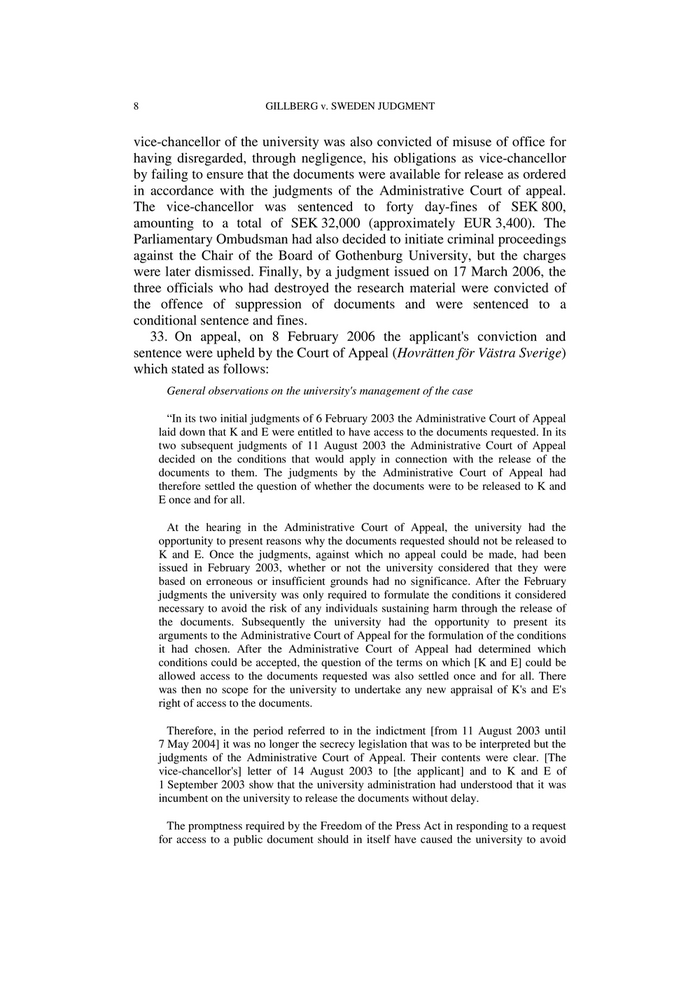
GILLBERG v. SWEDEN JUDGMENT 9 measures leading to further delay in releasing the documents. Despite this, in its interpretation of the conditions and in laying down additional conditions, the university made it more difficult for K and E to gain access to the documents. The applicant's liability The prosecutor has maintained that after the judgments of the Administrative Court of Appeal 11 August 2003 and until 7 May 2004, when the material is said to be destroyed, the applicant in his capacity as head of the Department of Child and Adolescent Psychiatry, has wilfully disregarded the obligations of his office by failing to comply with the judgments of the Administrative Court of Appeal and allow [E and K] access to the documents. According to the indictment, the applicant in so doing has not only refused to release the documents on his own account but also refused to make the documents available to the university administration. The research material was the property of the university and hence to be regarded as in the public domain. It was stored in the Department of Child and Adolescent Psychiatry, where [the applicant] was the head. [The vice-chancellor's] letter of 14 August 2003, to which copies of the judgments of the Administrative Court of Appeal relating to the conditions were attached, made it clear to [the applicant] that the material in question must be released. As head of the department, [the applicant] was responsible for making the material available to [K and E]. [The applicant's awareness of his immediate responsibility is revealed not least by the instructions that he gave to [L] before the visit of [P] not to allow the university administration access to the material. It is also shown by [the applicant's] written reply on 18 August 2003 to [the vice-chancellor]. Through [the vice-chancellor] the university had instructed [the applicant] to release the material to the university, so that it could be moved to premises where K and E could examine it. In view of this, the Court of Appeal, like the District Court, does not consider that [the applicant] can be held culpable because he refused on his own account to hand over the documents. However, it was incumbent upon him to make the documents available for removal in accordance with the instructions he had received from the university. [The applicant] has protested that he did not consider that there was any serious intent behind the instruction he received from the [vice-chancellor] on 14 August 2003. Here he has referred in particular to the meeting on 18 August 2003, to the fact that P did not follow up his visit to the department and that he received no new directive to make the material available. [The vice-chancellor], however, has stated that on no occasion did he withdraw the instructions issued on 14 August 2003, and that it must have been quite clear to [the applicant] that they continued to apply, even though they were not explicitly repeated. According to the vice-chancellor, nothing transpired at the meeting on 18 August 2003 that could have given [the applicant] the impression that these instructions no longer applied or that they were not intended seriously. [The vice-chancellor's] statement in this respect has been confirmed by the Director at the Vice-Chancellor's office, W. It is further borne out by the fact that after the meeting on 18 August 2003 W was given the task of drawing up a complaint to the Government Disciplinary Board for Higher Officials on the subject of [the applicant's] refusals and that the latter was aware that a complaint of this kind was being considered. In addition, it can be seen from a number of e-mails from [the applicant]
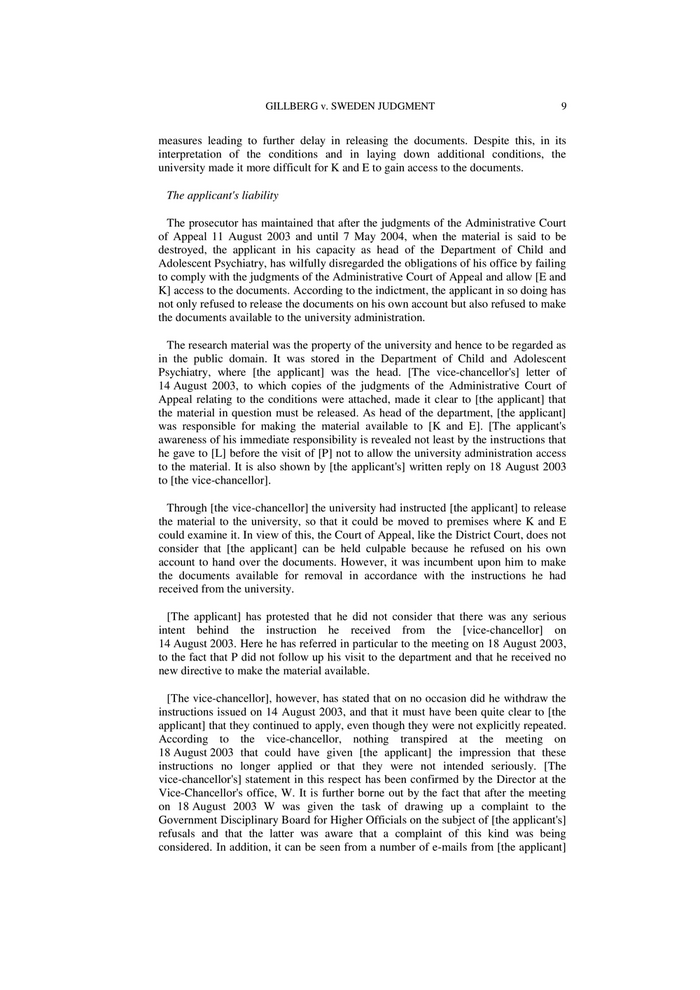
10 GILLBERG v. SWEDEN JUDGMENT to [the vice-chancellor] that during the entire autumn he considered that he was required to hand over the documents and that he maintained his original refusal to obey his instructions. It has also been shown that when the Board met on 17 December 2003, [the vice-chancellor] was still considering making a complaint to the Disciplinary Board. Finally, [a witness, AW] has testified that at a meeting with [the applicant] shortly after the beginning of 2004, when asked whether he still persisted in his refusal, he confirmed that this was the case. All things considered, the Court of Appeal finds that it has been shown that [the applicant] was aware of the instructions to make the material available to the administration applied during the entire period from when he learnt about the judgments of the Administrative Court of Appeal on 14 August 2003. It was incumbent on him to take the actions required to comply with the judgments. [The applicant] has stated that he was never prepared to participate in the release of the documents to K and E. His actions were, in other words, intentional and their result has been that K and E were categorically denied a right that is guaranteed by the Constitution and that is also of fundamental importance in principle. All things considered, the Court of Appeal finds that [the applicant's] actions mean that he disregarded the obligation that applied to him as head of department in such a manner that the offence of misuse of office should be considered. [The applicant] has however also objected that his actions should be regarded as excusable in view of the other considerations that he had to bear in mind. He has thus claimed that in the situation that had arisen he was prevented by medical ethics and research ethics from disclosing information about the participants in the study and their relatives. He referred in particular to international declarations drawn up by the World Medical Association and to the Convention. The nature of the international declarations agreed on by the World Medical Association is not such as to give precedence over Swedish law. [The applicant's] objections on the basis of the contents of these declarations therefore lack significance in this case. Article 8 of the Convention lays down that everyone has the right to respect for his or her private and family life, home and also that this right may not be interfered with by a public body except in certain specified cases. The provisions of the Secrecy Act are intended, in accordance with Article 8 of the Convention, to protect individuals from the disclosure to others of information about their personal circumstances in cases other than those that can be regarded as acceptable with regard to the right to insight into the workings of the public administration. These regulations must be considered to comply with the requirements of the Convention and the judgments of the Administrative Court of Appeal lay down how they are to be interpreted in this particular case. [The applicant's] objection that his action was excusable in the light of the Convention cannot therefore be accepted. [The applicant] has also asserted that he risked criminal prosecution for breach of professional secrecy, if he released the documents to [K and E]. However, the judgments of the Administrative Court of Appeal had determined once and for all that the secrecy Act permitted release of the documents. For this reason there was of course no possibility of prosecution for breach of professional secrecy which, in the opinion of the Court of appeal, [the applicant] must have realised.
